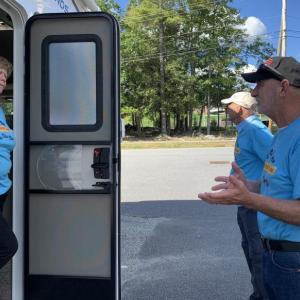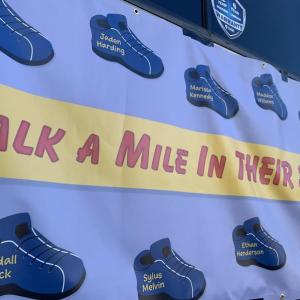For Kendall Chick
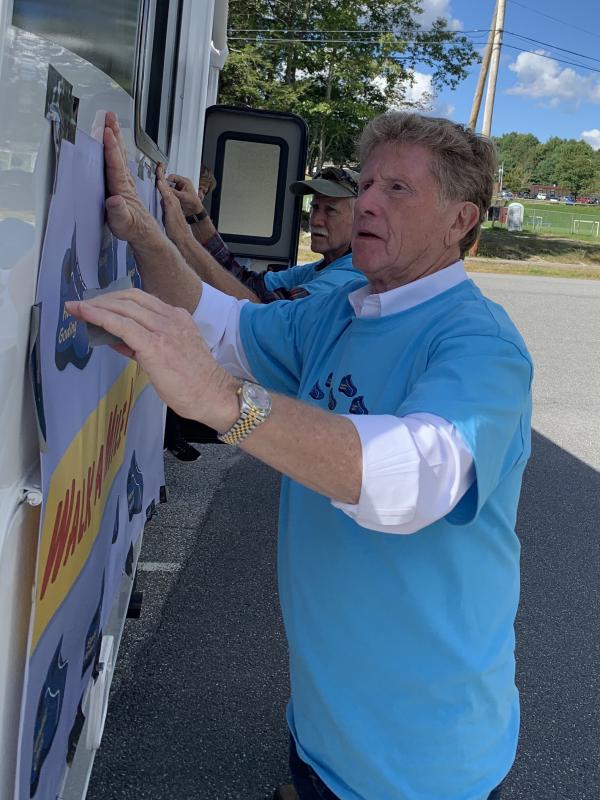 Maine Sen. Bill Diamond, D – Windham, foreground, and Rep. Jeff Hanley, R – Pittston, put a poster on a camper at Wiscasset Community Center Wednesday afternoon, Sept. 29, for a stop on Diamond’s “Walk a mile in their shoes tour” promoting child protective services reform and honoring Wiscasset’s Kendall Chick and other slain children. SUSAN JOHNS/Wiscasset Newspaper
Maine Sen. Bill Diamond, D – Windham, foreground, and Rep. Jeff Hanley, R – Pittston, put a poster on a camper at Wiscasset Community Center Wednesday afternoon, Sept. 29, for a stop on Diamond’s “Walk a mile in their shoes tour” promoting child protective services reform and honoring Wiscasset’s Kendall Chick and other slain children. SUSAN JOHNS/Wiscasset Newspaper
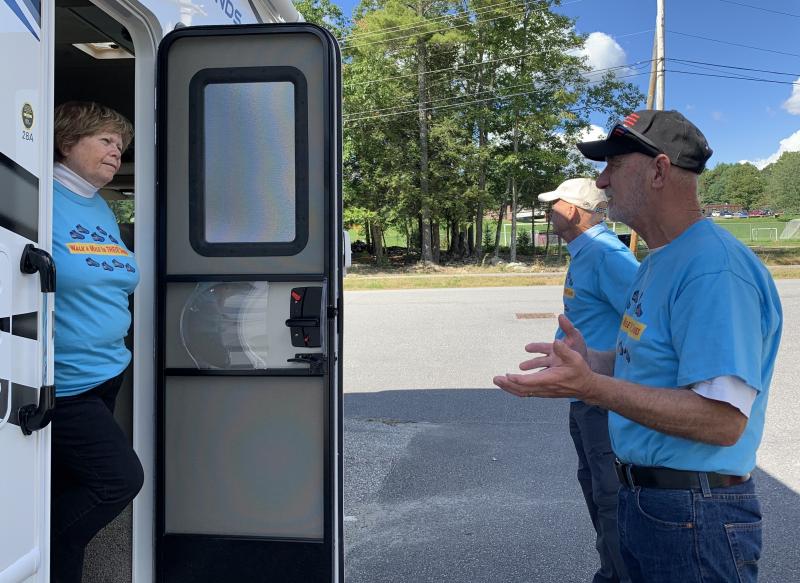 From left, volunteers Jane Diamond, Dennis Ela and Ron Eby stand by at the Wiscasset stop. SUSAN JOHNS/Wiscasset Newspaper
From left, volunteers Jane Diamond, Dennis Ela and Ron Eby stand by at the Wiscasset stop. SUSAN JOHNS/Wiscasset Newspaper

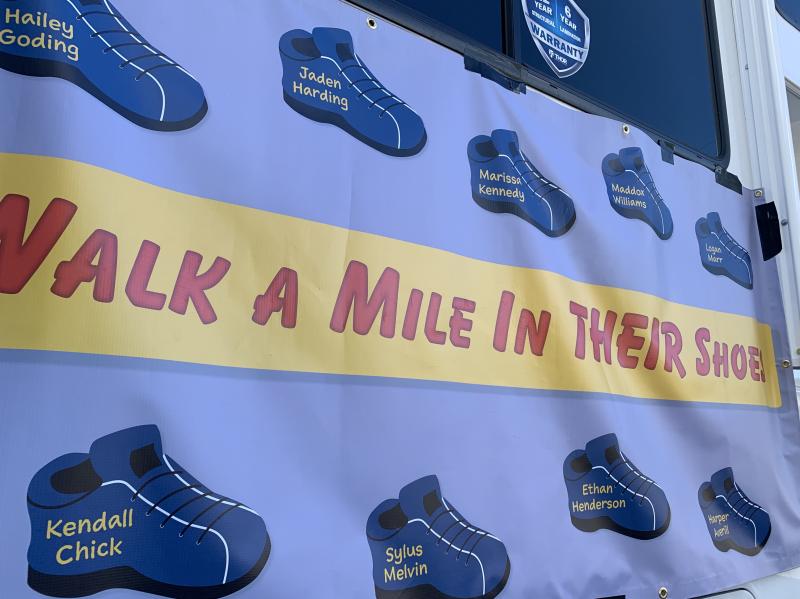 SUSAN JOHNS/Wiscasset Newspaper
SUSAN JOHNS/Wiscasset Newspaper
 Kendall Chick. Courtesy of Maine Attorney General’s Office
Kendall Chick. Courtesy of Maine Attorney General’s Office
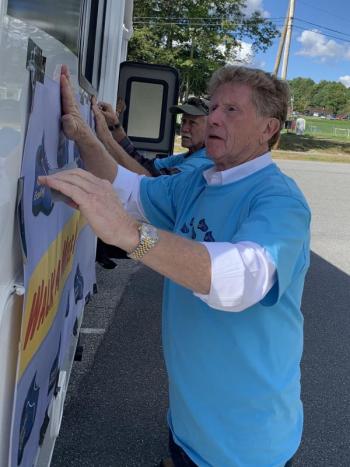 Maine Sen. Bill Diamond, D – Windham, foreground, and Rep. Jeff Hanley, R – Pittston, put a poster on a camper at Wiscasset Community Center Wednesday afternoon, Sept. 29, for a stop on Diamond’s “Walk a mile in their shoes tour” promoting child protective services reform and honoring Wiscasset’s Kendall Chick and other slain children. SUSAN JOHNS/Wiscasset Newspaper
Maine Sen. Bill Diamond, D – Windham, foreground, and Rep. Jeff Hanley, R – Pittston, put a poster on a camper at Wiscasset Community Center Wednesday afternoon, Sept. 29, for a stop on Diamond’s “Walk a mile in their shoes tour” promoting child protective services reform and honoring Wiscasset’s Kendall Chick and other slain children. SUSAN JOHNS/Wiscasset Newspaper
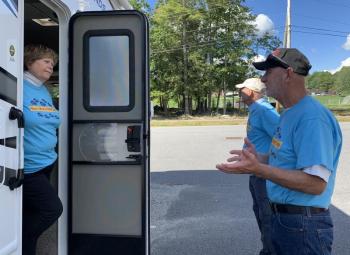 From left, volunteers Jane Diamond, Dennis Ela and Ron Eby stand by at the Wiscasset stop. SUSAN JOHNS/Wiscasset Newspaper
From left, volunteers Jane Diamond, Dennis Ela and Ron Eby stand by at the Wiscasset stop. SUSAN JOHNS/Wiscasset Newspaper

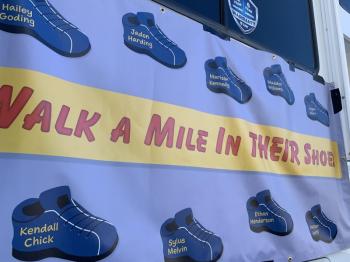 SUSAN JOHNS/Wiscasset Newspaper
SUSAN JOHNS/Wiscasset Newspaper
 Kendall Chick. Courtesy of Maine Attorney General’s Office
Kendall Chick. Courtesy of Maine Attorney General’s Office
Kendall Chick would have been going on 8 now. In 2019, her grandfather’s fiancé Shawna Gatto got 50 years in prison for the Wiscasset girl’s murder, at 4, in December 2017. Chick could still have been here, had Maine Department of Health and Human Services paid the family one more visit, Maine Sen. Bill Diamond, D – Windham, and Rep. Jeff Hanley, R – Pittston, said outside Wiscasset Community Center Wednesday afternoon, Sept. 29.
“I’m convinced that little girl would be alive today,” said Diamond, who attended Gatto’s trial. “All of that brutality didn’t have to happen.”
In college, Diamond, later Maine’s Secretary of State, sold worms he dug on Wiscasset’s mudflats. Wednesday, he, Hanley, Diamond’s wife of 53 years Jane and friends Dennis Ela, who taught at Manchester School in North Windham when Diamond was principal, and retired Windham businessman Ron Eby were in the WCC lot, at a camper that read “Walk a mile in their shoes.” That meant the lives and deaths of Chick and other Maine children slain at the hands of, or in some cases allegedly at the hands of, family. Chick’s name and eight others were on shoes on a poster Diamond and Hanley taped to the camper. Camping World of Windham donated the camper’s use, Diamond said.
The Wiscasset stop capped the two-day tour of the children’s towns. Diamond came up with it – and its name he plans to register with the state to maybe use again – as he pushes to reform child protection in Maine. He’s been trying for two decades. He said he is in his last year in the legislature and wants to succeed on the issue while he’s still a lawmaker.
“We’re trying to keep the awareness high ... enough is enough. The system is broken ... We’re trying to say, ‘Please admit that so we can fix it,’” Diamond said. “They say, ‘We’re going to improve on our improvements.’ Well I’m sorry, but I’ve heard that,” through several administrations, he said. “And it hasn’t happened.”
Hanley added, “A lot of years of the same behavior, over and over.” He supports Diamond’s pursuit of breaking out child protection from DHHS into a separate agency. That bill died last year and he plans a similar one, Diamond said.
Hanley also took part in the tour’s next to last stop, in Chelsea, in memory of Logan Marr.
Turnout at each stop ranged from the single digits to about 20 people, not counting those who sounded their car horns or rolled down their car windows and waved when the group carried signs while walking next to the camper under law enforcement escort, including on the way to WCC, group members said. In some towns, Wiscasset included, officers told the group they had been on the calls to the scenes of the children’s deaths.
The only attendees at the 2 p.m. Wiscasset stop were two reporters. Diamond blamed himself, due to having to move it up two hours. Wiscasset Newspaper got an email with the time change shortly after 8 am. and announced it on the newspaper’s website and Facebook page.
Diamond said the lack of attendees in Wiscasset and the size of turnout at the other stops did not discourage him “in the least”; and motorists’ waves and car horns peeping everywhere, including Route 27 in Wiscasset for the camper and the group, encouraged him. So did the help from law enforcement, the media’s turnout at each stop, which he said will help keep the issue on Mainers’ minds; and the participation of lawmakers from both sides of the aisle. He and the rest of the group said they had seen over the two days, Maine people feel as they do that the system needs fixing.
“Everyone who’s come out has been very passionate about the cause,” Eby said. “It’s hard, like for everything, to get people to stop what they’re doing and come out, and we understand that. But (this tour is) keeping the message going.”
Wiscasset Newspaper contacted DHHS spokesman Jackie Farwell for comment on the group’s remarks in Wiscasset. Farwell responded: “We care deeply about child safety and well-being and are working to do all we can to learn from the recent child deaths and improve our approach to child welfare. The death of a child is a tragic loss – for that child’s future, their family, their community, and our state.”
To that end, DHHS is partnering with Casey Family Programs to evaluate department policies and practices “to support child and family safety as we continue our broader work to improve the child welfare system, along with the Legislature and many other stakeholders,” Farwell said. “The DHHS Office of Child and Family Services engaged in a comprehensive system-wide assessment that has informed improvement efforts over the last few years. This includes the recent federal approval of our Family First plan to protect children and strengthen families.”
Farwell said DHHS has added more than 70 staff jobs in child welfare since 2018 and has grown the number of foster homes by nearly 30% since 2019. Staff turnover is down from nearly 23% in 2018 to 15% last year, largely due to increased pay, staffing and training and a focus on workforce wellness and “studying and understanding” the child welfare caseload’s impact on staffing needs, she said.
Farwell added, University of Southern Maine’s Muskie School of Public Service has helped DHHS review and update policies, write new ones and boost training.
Jane Diamond said she was proud of her husband’s tour and his years working on the issue.
Event Date
Address
United States


